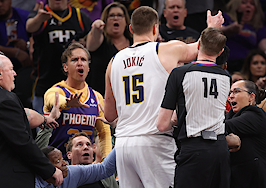In May, we’ll go deep on money and finance for a special theme month, by talking to leaders about where the mortgage market is heading and how technology and business strategies are evolving to suit the needs of buyers now. A prestigious new set of awards, called Best of Finance, debuts this month too, celebrating the leaders in this space. And join Mortgage Brief for weekly updates all year long.
Shares in the nation’s biggest mortgage lender, United Wholesale Mortgage (UWM) sagged Wednesday as first-quarter mortgage production fell to a new low since the company made its debut as a publicly traded company nearly three years ago.
Pontiac, Michigan-based UWM posted a first-quarter (Q1) net loss of $138.6 million, compared to $453.3 million in profits during the same period a year ago and a $62.5 million fourth-quarter 2022 loss. At $161.3 million, net revenue was down 80 percent from a year ago.
But as UWM CEO Mat Ishbia noted, the big driver of the Q1 loss was a $337 million write-down in the fair value of the company’s rights to collect payments on nearly $300 billion in mortgages on behalf of investors.
UWM earns fees for collecting payments on those loans, which are paid by investors who buy mortgages when they’re packaged into securities. The value of UWM’s mortgage servicing rights (MSRs) can decline when interest rates fall, in part because borrowers are more likely to refinance and end up with another servicer.

Mat Ishbia
“While we can’t control interest rates or the effect of those fluctuations on our MSR portfolio, we can control our operational profitability and have demonstrated that our business model performs despite the natural cyclicality that occurs in the mortgage industry,” Ishbia said in a statement.
Looking at another measure of operational profitability that excludes the change in fair value of MSRs — adjusted earnings before interest, taxes, depreciation and amortization (EBITDA) — UWM booked $141 million in Q1 adjusted earnings, up from $60.4 million in Q4 2022 and $128.4 million a year ago.
But shares in UWM, which over the last year have traded for as little as $2.84 and as much as $6.35, dropped 18 percent after earnings were released to close at $4.78 Wednesday.
In a note to clients, BTIG analyst Eric Hagen said shares in UWM have “put up an impressive rally off the lows around the end of last year, when mortgage rates and spreads were near the wides.” But UWM’s valuation is “hard to pinpoint” given the range of business models and cost of funding across the mortgage lending industry.
UWM overtook rival Rocket Mortgage last year by slashing prices to make the mortgage brokers it works with more competitive with homebuyers. That cut into profit margins, and now it remains to be seen if UWM will be able to keep borrowing money at favorable rates to originate new loans if mortgage rates keep sliding.
“We still think the broker channel can be more effective for borrowers in a high interest rate environment because they’re more likely to shop for a rate, which we think pairs nicely with having among the fastest turn times in the industry for borrowers to get approved and close their loan,” Hagen told clients.
On a call with investment analysts, Ishbia said that if mortgage rates drop by a percentage point, “there’s a good chance our [loan origination] business doubles,” as buyers and sellers come off the sidelines. “Our margins are higher. That’s why I try to explain to people that in ’24, ’25 ’26, we’ll make multiple billion dollars is our expectation. It just depends on when that happens. I don’t control rates.”
UWM said Q2 loan production is expected to be in the $23 to $30 billion range, with gain-on-sale margin of 75 to 100 basis points.
At 92 basis points, UWM’s Q1 gain margin was “also at the higher end of the guidance and up from 51 basis points from the fourth quarter,” Ishbia noted. “We have controlled our business and are very happy with both our margins and volume in Q1.”
During the coronavirus pandemic-fueled refinancing boom of 2020, UWM’s gain margins soared above 300 basis points, peaking at 3.18 percent in the third quarter of 2020.
Today, “UWM’s relatively higher purchase mix drives a balanced model that is positioned to perform well when rates are not conducive to refinance activity,” the company said in an investor presentation.
Hagen said the fact that UWM’s margins “appear to be stabilizing” will support the 10 cents per share dividend the company has been paying shareholders while allowing the company to remain competitive on price.
UWM’s Q1 originations lowest since going public

Source: UWM regulatory filings
Although loan originations hit a new low since UWM went public in September 2020, Q1 loan production was down less drastically than revenue and profits, dropping 42 percent from a year ago to $22.3 billion.
While refinancing volume was down 84 percent to $3.1 billion, purchase loan originations were up slightly from a year ago at $19.2 billion.
“The $19.2 billion of purchase volume was a first-quarter production purchase record for us,” Ishbia said. “We’ve been very proud of these metrics particularly in this rate environment and with the general declines for most in the industry.”
At $205.4 million, loan production income was down 46 percent from a year ago. But the revenue UWM generates as a loan servicer was up 10 percent, to $218.6 million.
UWM also managed to slash expenses by 17 percent from a year ago, to $300.9 million, having shed 25 percent of its workforce last year, or 2,000 workers, through attrition.
Get Inman’s Mortgage Brief Newsletter delivered right to your inbox. A weekly roundup of all the biggest news in the world of mortgages and closings delivered every Wednesday. Click here to subscribe.













